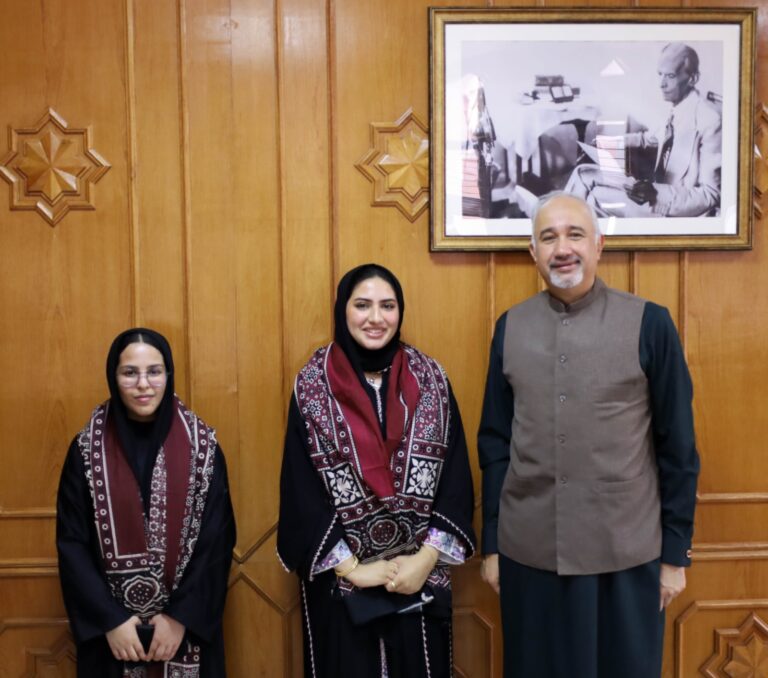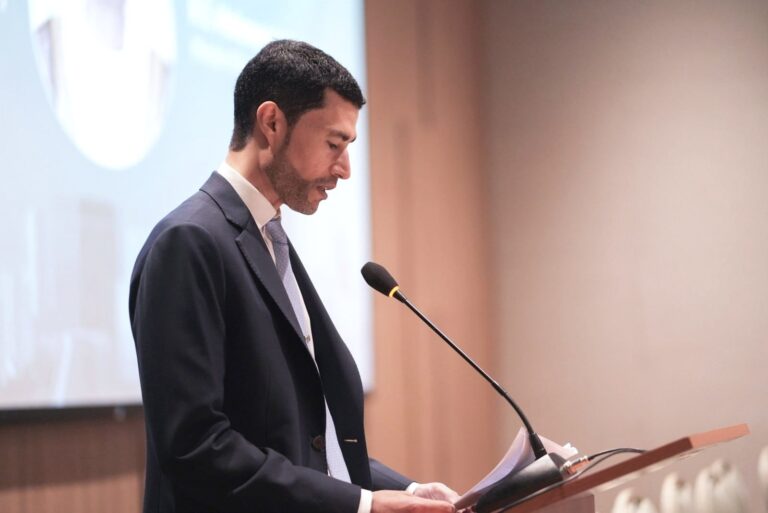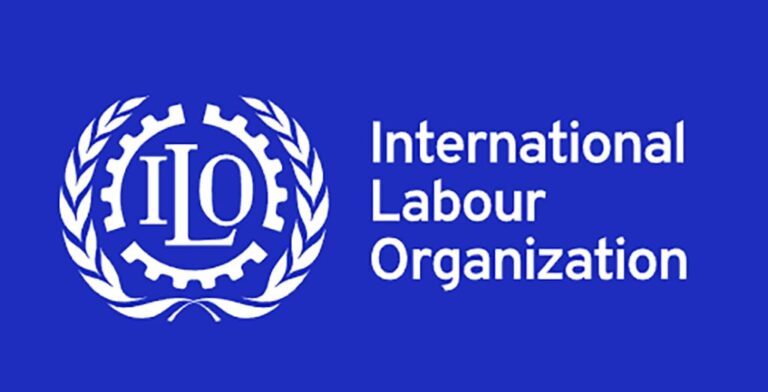Welcoming Zayed University Students at Pakistan Embassy, Highlighting UAE Leadership’s Vision
write the title based on: I welcomed students of Zayed University Abu Dhabi at the Pakistan Embassy on July 30, 2024 and praised the vision of the UAE leadership including late Sheikh Zayed Bin Sultan Al Nahyah in transforming the country into an economic and tourism hub.
CBI records 14% growth in net profit in H1 2024
DUBAI, 25th July, 2024 (WAM) — Commercial Bank International (CBI) has announced its financial results for the first half of 2024, with pre-tax net profit growing 14 percent year-on-year (YoY) from AED78.9 million to AED89.9 million.
In a press release today, the bank said that the increase in net profit comes on the back of a combination of strategic initiatives, including, a customer-centric approach, and prudent risk management.
Customer deposits saw a significant 24.6 percent YoY increase, growing from AED11.4 billion to AED14.2 billion, reflecting CBI’s successful efforts in expanding its customer base and enhancing deposit products. Meanwhile, the Bank’s loans and advances, increased steadily by 1.9 percent from AED12.3 billion to AED12.5 billion YoY.
Ali Sultan Rakkad Al Amri, CEO of Commercial Bank International, said, “I am pleased to report that CBI has closed out the first half of the year on a strong note, which saw us continue to deliver on our strategies and successfully address the growing needs of the Bank’s expanding client base. Looking ahead, we aim to further enhance CBI’s customer experience through the development of new products and services, streamlining processes, and leveraging technology to deliver a seamless and convenient banking experience.
“Ultimately, our strategy aligns perfectly with our commitment to supporting the UAE’s continued economic prosperity, and we are confident that by building on this momentum in the second half of the year, we will continue to deliver and unlock sustainable value for our customers, investors, and the communities we serve.”
UAE reaffirms support for sustainable finance, climate action empowerment
RIO DE JANEIRO, 25th July, 2024 (WAM) — Mohamed Hadi Al Hussaini, Minister of State for Financial Affairs, has reaffirmed the UAE’s commitment to sustainable finance and collaboration with Brazil, the current Chair of G20, to achieve climate finance goals, emphasising that finance has been and is still key for enabling climate action.
Al Hussaini announced the UAE’s plan to address the financing gap by the UAE banks offering sustainable financing by 2030 and contributing to the International Monetary Fund for resilience and sustainability to support countries vulnerable to climate change. He also highlighted that the UAE is the largest contributor to the GFMR trust fund.
Al Hussaini made these remarks during his participation in the COP28-G20 Conference on Sustainable Finance, held in Rio de Janeiro, Brazil, on 24th July. The conference was part of the G20 finance ministers and central bank governors’ meetings, which was co-organised by COP28 and Brazil.
Present at the conference were Samir Sharifov, Minister of Finance, Azerbaijan; Fernando Haddad, Minister of Finance, Brazil; Marina Silva, Minister of Environment and Climate Change, Brazil; Sri Mulyani Indrawati, Minister of Finance, Indonesia; Marsha Caddle, Minister of Industry, Innovation, Science and Technology, Barbados; and senior representatives of multilateral development banks.
“During the COP28 conference, hosted by the UAE last year, a global consensus was reached on the need to limit the temperature rise to 1.5°C. This requires a fair and orderly transition away from fossil fuels, with global targets set to triple renewable energy and double energy efficiency by the end of the decade. To achieve these objectives, we will need to mobilise all sources of public, private, and charitable funding,” stated Al Hussaini at the COP28-G20.
“Realising this goal demands a shift towards climate investments and this presents an unparalleled opportunity for prosperity and economic growth. We need an international framework that supports the distribution of finance in ways that mitigate investment risks in developing countries,” Al Hussaini added.
The minister noted that the launch of the Global Climate Finance Framework at COP28 received support from many G20 member countries, commending the close collaboration with a team of high-level experts, which provided a roadmap for the necessary actions to implement this framework. He highlighted that finance ministries play a pivotal role in leading the transition towards climate investments.
Al Husseini pointed out that the G20’s review of multilateral climate funds this year, under the Brazilian presidency, is a necessary move to promote the agenda for accessible and affordable financing. “We hope that COP28 and G20 will establish a robust foundation for future COP conferences, which will be essential for propelling climate finance progress,” he added.
The conference featured discussions on creating a renewable financial structure to facilitate sustainable finance, unlocking investment opportunities for climate action, expanding concessional financing, and enabling private-sector financing. It also discussed the role of multilateral development banks in becoming more effective and mobilising financial resources for national contribution plans.
The UAE, represented by the Ministry of Finance and the Central Bank of the UAE, took part in the third G20 Finance Ministers and Central Bank Governors (G20 FMCBG) meeting.
The UAE delegation was led by Mohamed Bin Hadi Al Hussaini, Minister of State for Financial Affairs, and included Ibrahim Obaid Al Zaabi, CBUAE’s Assistant Governor of the Monetary Policy and Stability Department; Ambassador Majid Al Suwaidi, COP28 Director-General; Ali Abdullah Sharafi, Assistant Under-Secretary of the International Financial Relationship Sector at the MoF; and Thuraiya Hamed Alhashmi, Acting Director of Relations and International Financial Organisations at the MoF.
Brazil, holding the current presidency, has steered the G20’s agenda on sustainable finance through the Sustainable Finance Working Group (SFWG). The group is working to advance the implementation of the Sustainable Finance Roadmap—a comprehensive, multi-year plan designed to guide the G20’s efforts on climate and sustainable finance.
This roadmap outlines four key priorities: enhancing access to international environmental and climate funds; fostering fair, reliable, and robust transformation plans; and establishing sustainability reporting standards that accommodate the diverse needs of all stakeholders, including SMEs, developing countries, and emerging markets.
Heat, a silent killer that threatens health, lives of workers worldwide, ILO report finds
GENEVA, 25th July, 2024 (WAM) — A new report from the International Labour Organisation (ILO), Heat at work: Implications for safety and health, warned that more workers are being exposed to heat stress worldwide.
The report estimated that 4,200 workers globally lost their lives to heatwaves in 2020. In total, 231 million workers were exposed to heatwaves in 2020, marking a 66 per increase from 2000. Nonetheless, the report stressed that nine out of ten workers globally were exposed to excessive heat outside of a heatwave and eight in ten occupational injuries from extreme heat happened outside of heatwaves.
The new data revealed that regions previously unaccustomed to extreme heat will face increased risks, while workers in already hot climates will confront ever more dangerous conditions.
Heat stress is an invisible and silent killer that can quickly cause illness, heatstroke or even death. Over time, it can also lead to serious heart, lung and kidney problems for workers, the study underlined.
Overall, the report indicates that workers in Africa, the Arab region, Asia and the Pacific are most often exposed to excessive heat. In these regions, 92.9 percent, 83.6 percent and 74.7 percent of the workforce are affected, respectively. The figures are above the global average of 71 percent, according to the most recent figures available (2020).
The fastest-changing working conditions are seen in Europe and Central Asia, the report said. From 2000 to 2020 the region recorded the largest increase in excessive heat exposure, with the proportion of workers affected rising by 17.3 percent, almost double the global average increase.
Meanwhile, the Americas, Europe and Central Asia are witnessing the largest rise in workplace injuries from heat stress since the year 2000, with increases of 33.3 percent and 16.4 percent respectively. This is possibly due to hotter temperatures in regions where workers are unaccustomed to heat, according to the report.
“As the world continues to grapple with rising temperatures, we must protect workers from heat stress year-round. Excessive heat is creating unprecedented challenges for workers worldwide year-round, and not only during periods of intense heatwaves, said ILO Director-General Gilbert F. Houngbo.
Improved safety and health measures to prevent injuries from excessive heat in the workplace could save up to US$361 billion globally – in lost income and medical treatment expenses – as the heat stress crisis accelerates, affecting global regions differently, the study emphasised.
The ILO estimates show that low- and middle-income economies, in particular, are the most affected, as the costs of injuries from excessive heat in the workplace can reach around 1.5 percent of national GDP.
“This is a human rights issues, a workers’ rights issue, and an economic issue, and middle-income economies are bearing the biggest brunt. We need year-round heat action plans and legislation to protect workers, and stronger global collaboration among experts to harmonise heat stress assessments and interventions at work,” Houngbo added.
The impact of heat on workers worldwide is fast becoming a global issue and one that requires action.
“If there is one thing that unites our divided world, it’s that we’re all increasingly feeling the heat. Earth is becoming hotter and more dangerous for everyone, everywhere. We must rise to the challenge of rising temperatures – and step up protections for workers, grounded in human rights,” explained the UN Secretary-General, Antonio Guterres.





